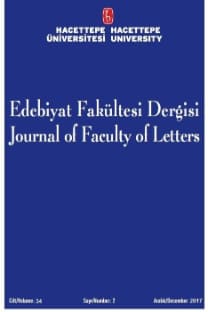Belgesel Tiyatroda Karşı Duruş olarak Bellek The Laramie Project ve The Exonerated
Belgesel Tiyatro, The Exonerated, The Laramie Project, Bellek Çalışmaları
Memory as Resistance in Documentary Drama The Laramie Project and The Exonerated
___
- Bean, Christine Simonian. (2014). “Dramaturging the Truth in The Exonerated: Ethics, Counter-Text, and Activism in Documentary Theatre.” Theatre Topics, Volume 24, Number 3, September, pp. 187-197.
- Blank, Jessica. Eric Jensen. (2005). “The Uses of Empathy: Theatre and the Real World.” Theatre History Studies. June.
- Blank, Jessica. Erik Jensen. (2005). Living Justice: Love, Freedom, and the Making of the Exonerated. New York: Atria.
- Dolan, Jill. (2005). Utopia in Performance: Finding Hope at the Theater. Ann Arbor: The University of Michigan Press.
- Forsyth, Alison and Chris Megson, eds. (2009). Get Real: Documentary Theatre Past and Present. New York: Palgrave.
- Gaines, Jane. (1999). “Political Mimesis” in Collecting Visible Evidence, eds. Jane M. Gaines and Michael Renov. Minneapolis: University of Minnesota Press.
- Isolation in the US Federal Prison System. (2014). https://www.amnestyusa.org/files/amr510402014en.pdf Access Date: 10/12/2017.
- Innes, Christopher. (2007). “Towards a Post-Millennial Mainstream? Documents of the Times,” Modern Drama. 50.3.
- Kalb, Jonathan. (2001). “Documentary Solo Performance: The Politics of the Mirrored Self.” Theater, Volume 31, Number3, Fall.
- Kaufman, Moises, The Members of Tectonic Theatre Project (2001). The Laramie Project. New York: Vintage Books.
- Kuchwara, Michael. (2000). “The Laramie Project (Review),” Associated Press Online, 18 May.
- Malkin, Jeannette R. (1991). Memory-Theater and Postmodern Drama. Ann Arbor: The University of Michigan Press.
- Paget, Derek. (2008). “New Documentarism on Stage”. ZAA, 56.2.
- Paget, Derek. (2009). “‘The Broken Tradition’ of Documentary Theatre and Its Continued Powers of Endurance” In Get Real, Forsyth, A., Megson, C., eds. New York: Palgrave Macmillan.
- Peter Marks. (2007). “Injustice Gone Insane”. Washington Post, June 21. http://www.washingtonpost.com/wp-dyn/content/article/2007/06/20/AR2007062002432.html. Accessed on 3/12/2017.
- Rickman, Alan, and Katherine Viner, eds. (2008). My Name is Rachel Corrie: Taken From the Writings of Rachel Corrie. New York: Dramatists Play Service.
- Roberts, John Michael, Nick Crossley, eds. (2004). “Introduction.” Sociological Review Monograph Series: After Habermas: New Perspectives on the Public Sphere. Volume 52, Issue s1.
- Su, John S. (2005). Ethics and Nostalgia in the Contemporary Novel. New York: Cambridge UP.
- Svich, Caridad. (2003). “Moises Kaufman: ‘Reconstructing History Through Theatre’ – An Interview.” Contemporary Theatre Review, Vol. 13(3), 67-72.
- Tigner, Amy L. (2002). “The Laramie Project: Western Pastoral.” Modern Drama. Vol. 45, Number 1, Spring.
- Wade, Leslie A. (2009). “Sublime Trauma: The Violence of Ethical Encounter” in Violence Performed: Local Roots and Global Roots of Conflict. Patrick Anderson, Jisha Menon, eds. New York: Palgrave.
- Watts, Ian. (2000). The Rise of the Novel. Berkeley: University of California Press.
- ISSN: 1301-5737
- Yayın Aralığı: 2
- Başlangıç: 1983
- Yayıncı: Emine Erdoğan Özünlü
18. Yüzyıldan 20. Yüzyıla Yunanistan’da Dil Sorunu ve Ulusal Bireyin İcadı
Orphan Black’te İnsan Ötesi Dişil Kimlikler ve Sayborg Aliceler
Masal Uyarlamalarının Vladimir Propp’un Yaklaşımı ile İncelenmesi “Pamuk Prenses” Masalı Örneği
Bizans El Yazmalarındaki İncilci Minyatürlerinden Cam Hokkalar
Toplumsesbilgisel Açıdan Türkçede Perde Genişliğinin Konuşma Algısı ve Belirtisellik
Bulgaristan Türkü Göçmen Kadınlarının Öz-Kimlik İnşası
Dostlar ve Hizipler Üzerine: Shakespeare’in Tarih Oyunları
Temel İnsani Değerler ile Yaşam Doyumu Arasındaki İlişki: Sivas Cumhuriyet Üniversitesi Örneği
